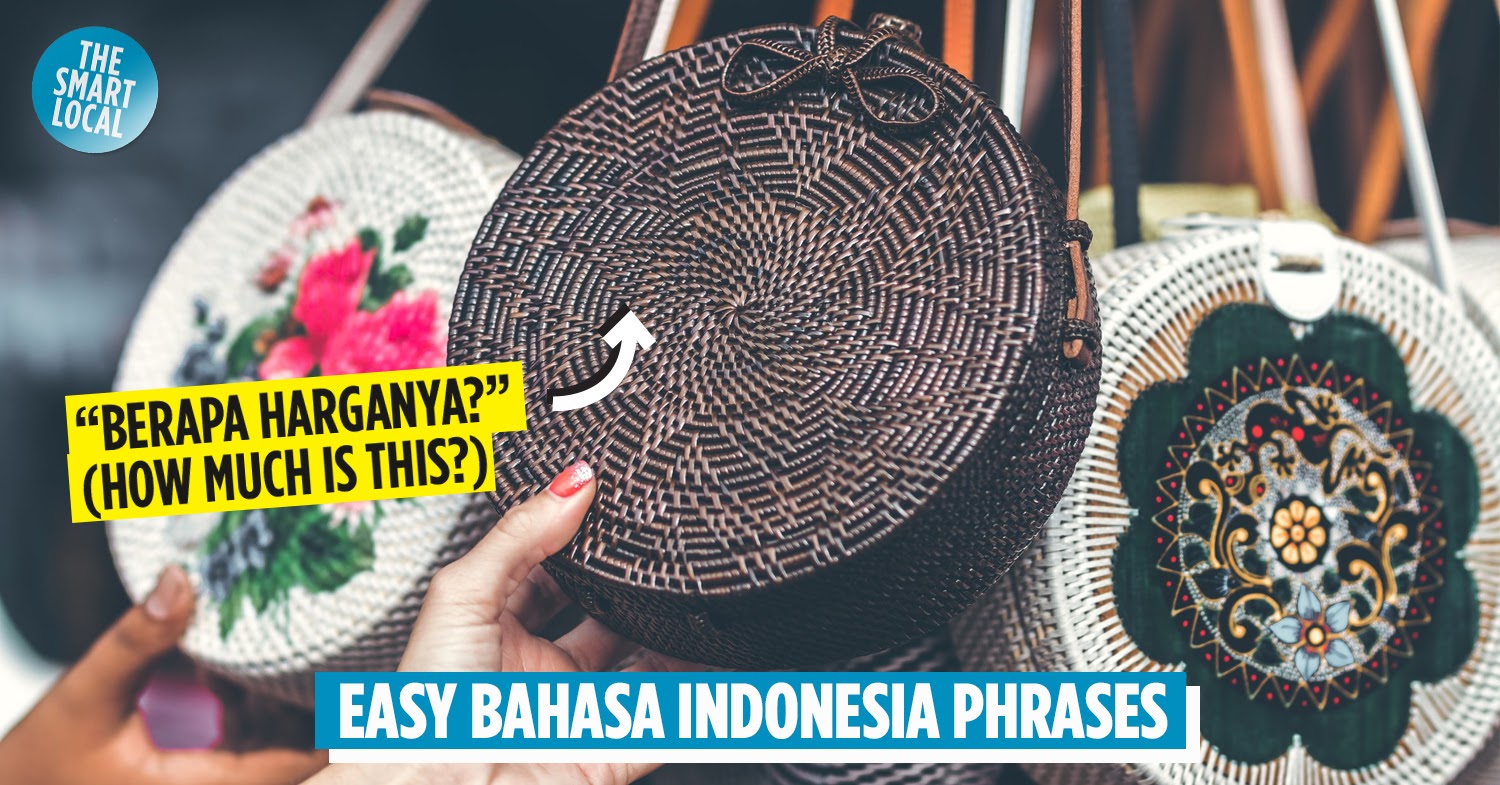Basic Indonesian phrases to explore the country
Learning a new language when you’re in a new town is always rewarding, especially a language as rich as bahasa Indonesia. Among other things, speaking Indonesian is a sure way to win locals’ hearts, and will undoubtedly open new doors and opportunities to you as you get to know new people.
It may take a while for travelling to become a thing again, but you can always prepare early for your next trip to Indonesia by familiarizing yourself with these basic Indonesian phrases.
– Essential Indonesian phrases –
Here are some essential phrases, including greetings, that should come in handy when you explore Indonesia.
1. “Selamat pagi, selamat siang, selamat malam” (“Good morning, good afternoon, good evening”)
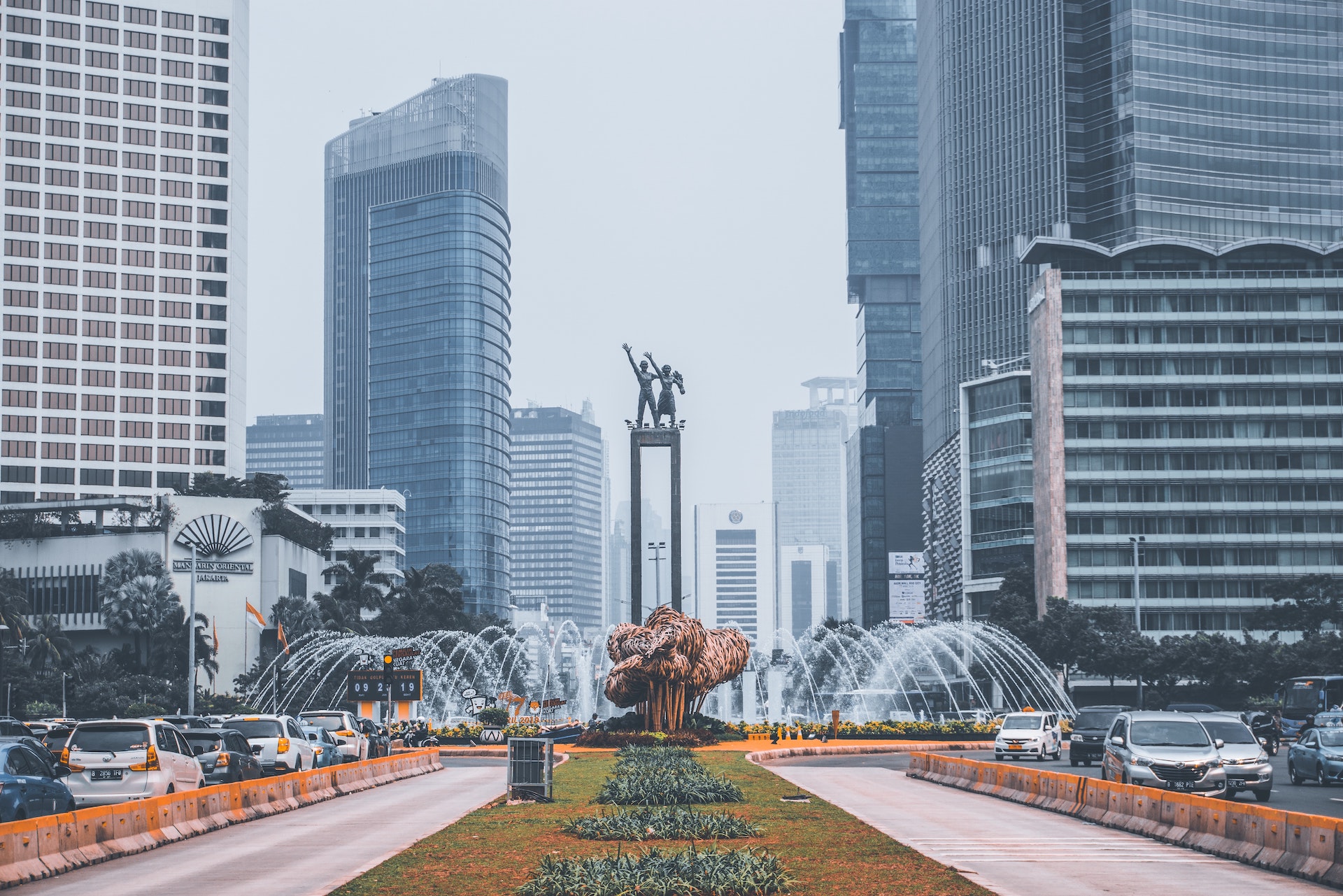
Patung Selamat Datang (the Welcome Monument) at the heart of Jakarta
Image credit: Eko Herwantoro
While “selamat” actually means “congratulations” in Indonesian, the word is commonly used in greetings to mean “good”. After all, experiencing a good day is worth congratulating.
Locals will appreciate the extra effort you took to learn basic greetings such as “selamat pagi” (good morning), “selamat siang” (good afternoon), and “selamat malam” (good evening), and chances are they will be more than eager to help you with anything once you impress them with these greetings.
2. “Apa kabar?” (“How are you?”)

Image credit: Priscilla Du Preez
Another sure way to impress locals is to ask them how they’re doing, and “Apa kabar?” is how you do it in Indonesian. This will let people know that you’re interested in what’s going on in their lives.
3. “Terima kasih” (“Thank you”)

Image adapted from: @garudaindonesiasg
“Terima kasih” (“thank you”) should come in handy in any situation such as when you’re chatting with locals, eating out at restaurants, or exploring a city on public transport. This is often abbreviated as “makasih” in informal situations.
4. “Sama-sama” (“You’re welcome”)
This is what you say in response to the above “terima kasih” (“thank you”), often used interchangeably with the more formal-sounding “terima kasih kembali”.
5. “Ya, tidak” (“Yes, no”)
Locals love to offer you things to welcome a newcomer properly, and in response, you can show off your Indonesian skills by answering “ya” (“yes”) or “tidak” (“no”) when asked if you want something.
6. “Permisi” (“Excuse me”)
At times you’ll find yourself having to interrupt somebody to ask a question, and in such situations, always preface what you’re going to say with “permisi” (“excuse me”). The phrase will also come in handy when you try to squeeze through a busy subway crowd.
You can tag a “permisi” in front of any question to convey extra politeness.
7. “Boleh saya bertanya?” (“May I ask a question?”)

Image credit: Daniel Hooper
Indonesians are renowned for their hospitality, so you need not be afraid or shy to ask questions when you need help navigating the country.
Say “boleh saya bertanya?” (“may I ask a question?”) beforehand, and they will be more than happy to respond.
8. “Hati-hati” (“Take care”)

Image credit: Cytonn Photography
When you have to part ways with someone who’s going somewhere else without you, say “hati-hati” (“take care”) to wish them well.
9. “Selamat tinggal” (“Goodbye”)
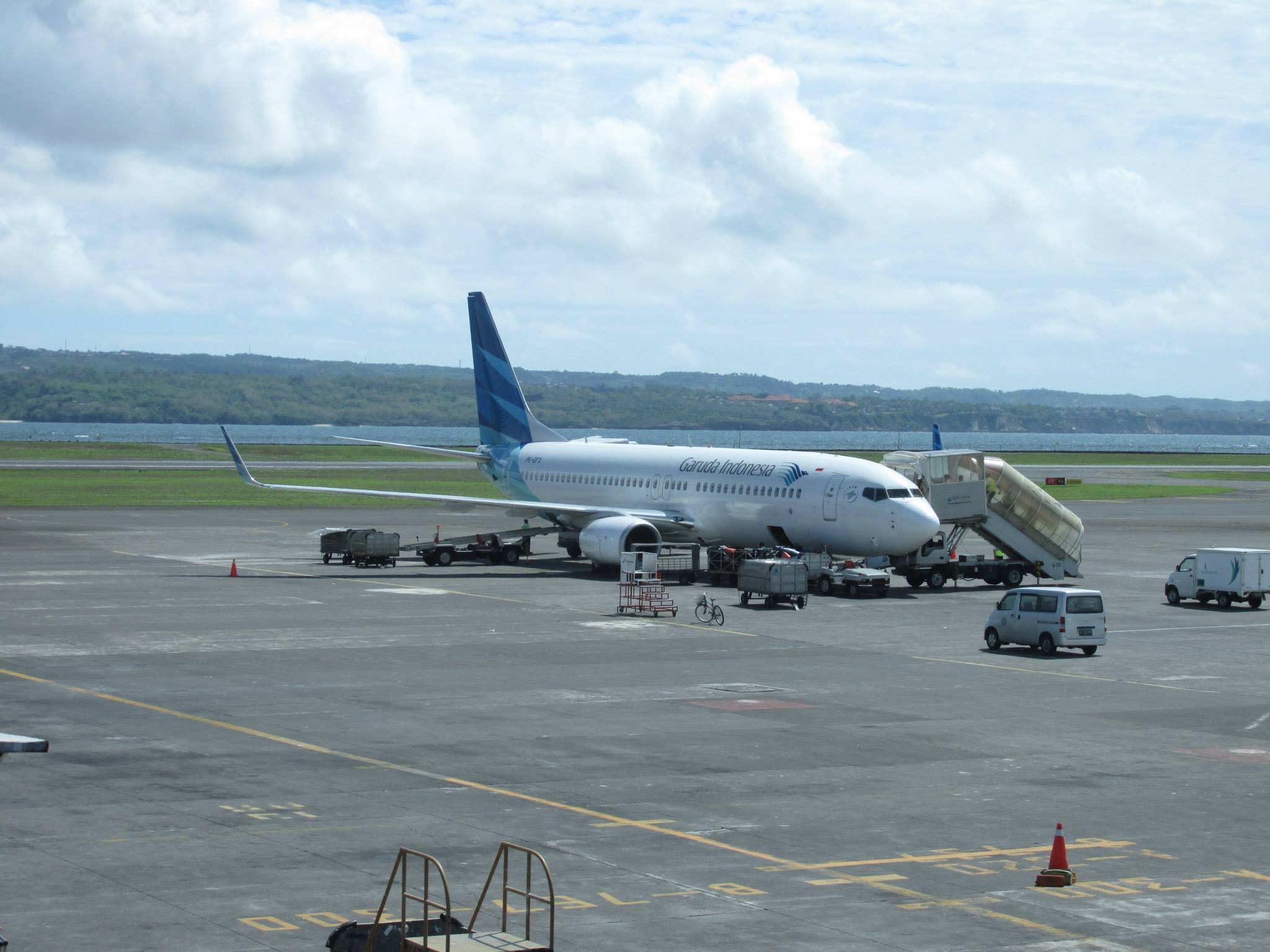
Image credit: Mentari Sandiastri
All good things must come to an end, and when it’s finally time to bid your farewell to new friends you’ve made during your trip, say “selamat tinggal”, which means “goodbye” as you leave to impress them with your Indonesian skills one last time.
– Travelling-related Indonesian phrases –
Exploring Indonesian cities such as hectic and vibrant Jakarta can be challenging, and here are some phrases that will help you navigate them more easily.
10. “Bagaimana saya bisa pergi ke [location]?” (“How do I get to [location]?”)
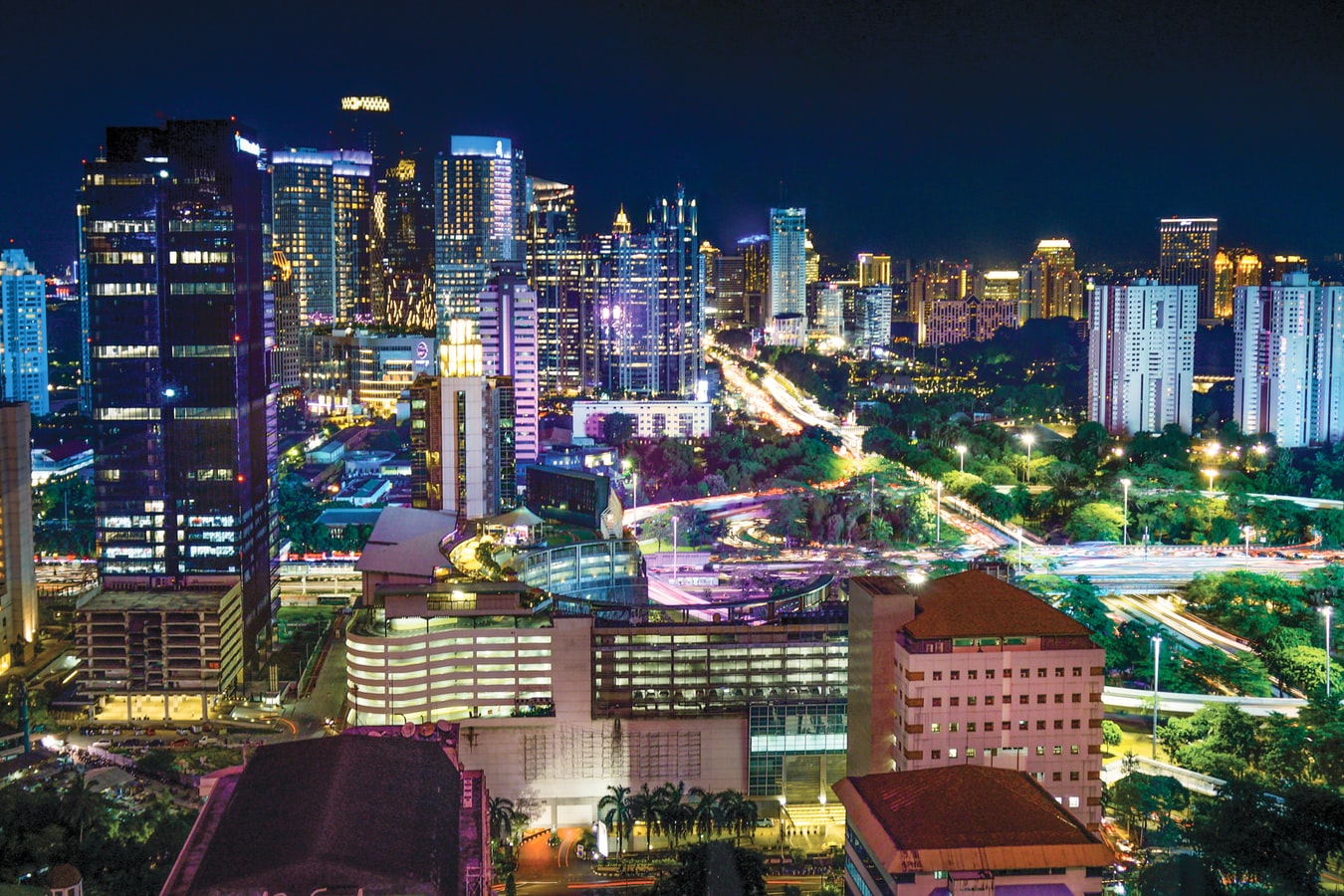
Image credit: Bayu Syaits
When you’re feeling overwhelmed with the concrete jungle that is Jakarta, sometimes it is best to just ask any local you encounter for directions.
Ask politely, “Bagaimana saya bisa pergi ke [location]”, which means “How do I get to [location]?”.
11. “Kiri” and “kanan” (“Left” and “right”)
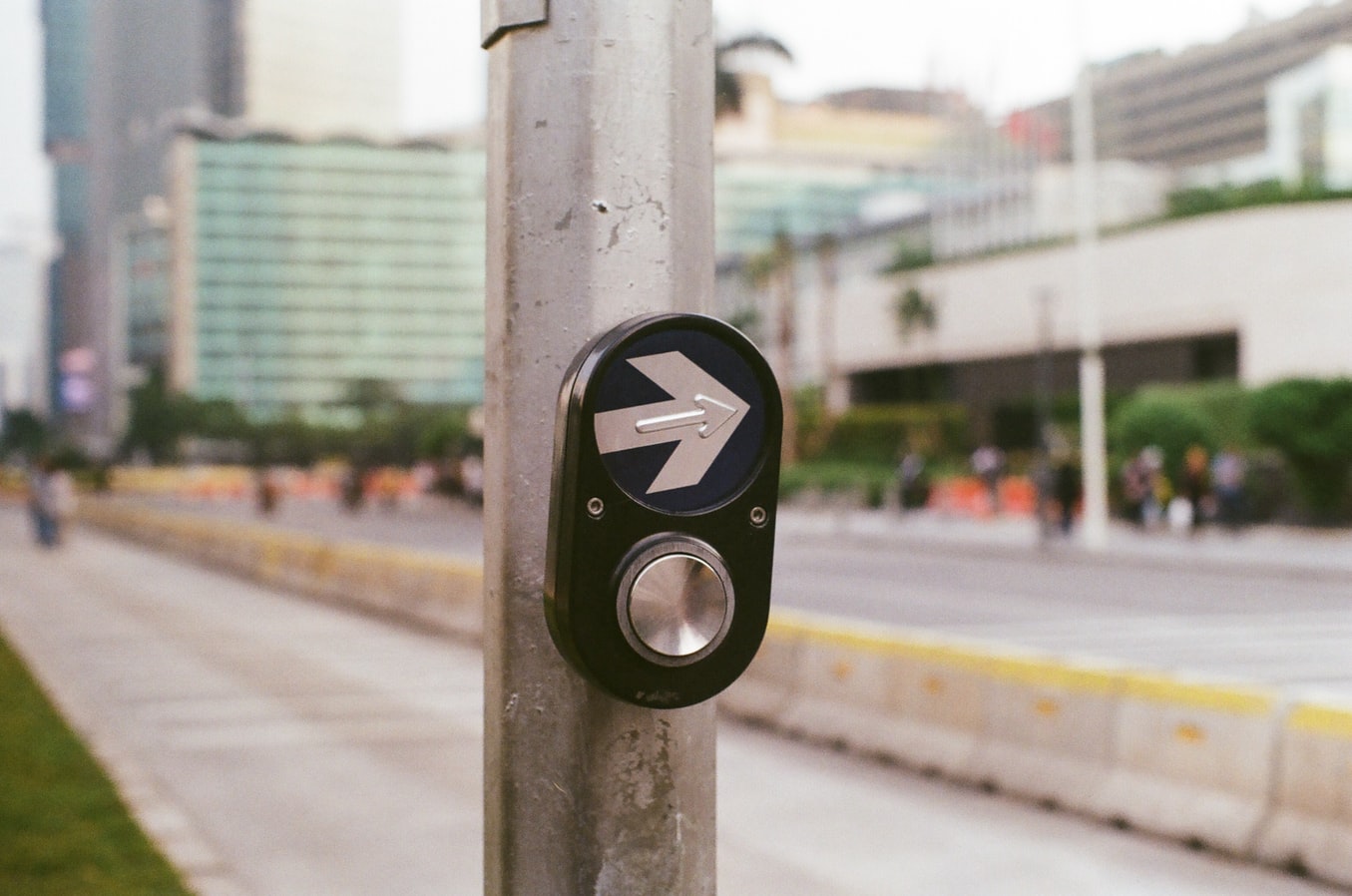
Image credit: Denissa Devy
When you ask for directions, a common reply from locals will be “Belok kiri di [landmark], lalu belok kanan di [landmark]” (“Turn right at [landmark], then turn left at [landmark]”).
Focus on the words “kiri”, which means “left”, and “kanan”, which means “right”.
12. “Apa benar ini jalan ke [location]?” (“Is this the right way to [location]?”
Sometimes you need to be 100% sure you’re on the right track, and there’s nothing better than asking a local to ensure that.
Asking “Apa benar ini jalan ke [location]?” or “Is this the right way to [location]?” will help you make sure you’re going in the right direction to your next destination.
– Phrases to help you use app-based transport services –
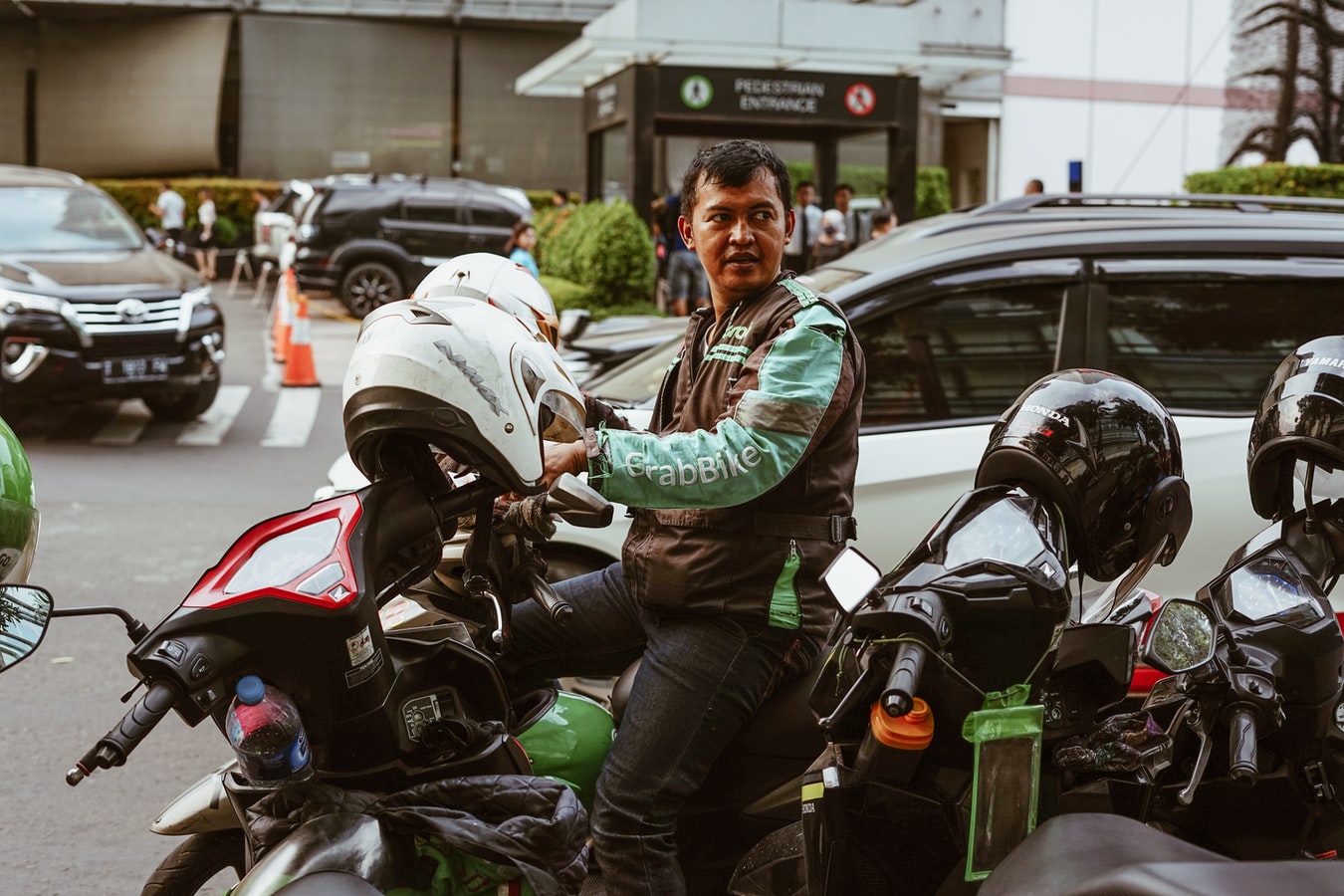
A driver on his motorbike taxi
Image credit: Afif Kusuma
Indonesian cities are notorious for their busy traffic, but thankfully technology has made it possible for you to order a transport service easily from anywhere using your smartphone.
Here’s what to say when you use an app-based transport service, be it a taxi or an ojek (motorbike taxi).
13. “Lokasi penjemputan sesuai peta, ya” (“Please pick me up at the location as shown on the map”)
Make sure your driver will pick you up right away where you are by saying “Lokasi penjemputan sesuai peta, ya”, which means “Please pick me up at the location as shown on the map.”.
14. “Tolong berhenti di sini” (“Please stop here”)
When getting off your taxi or ojek, remind the driver that you’re ready to alight as he or she reaches your destination by saying “Tolong berhenti di sini”, meaning “Please stop here”.
15. “Tolong antar saya ke [location]” (“Please take me to [location]”)
While your destination is displayed on the app as you order your trip in advance, you can still break the ice in person and catch your driver by surprise while telling them your destination by saying “Tolong antar saya ke [location]” which means “Please take me to [location]”.
You can also show them your ojek app on your screen to verify that you’re indeed the rider who’s just booked their cab, for safety and verification purposes.
– Using public transport –
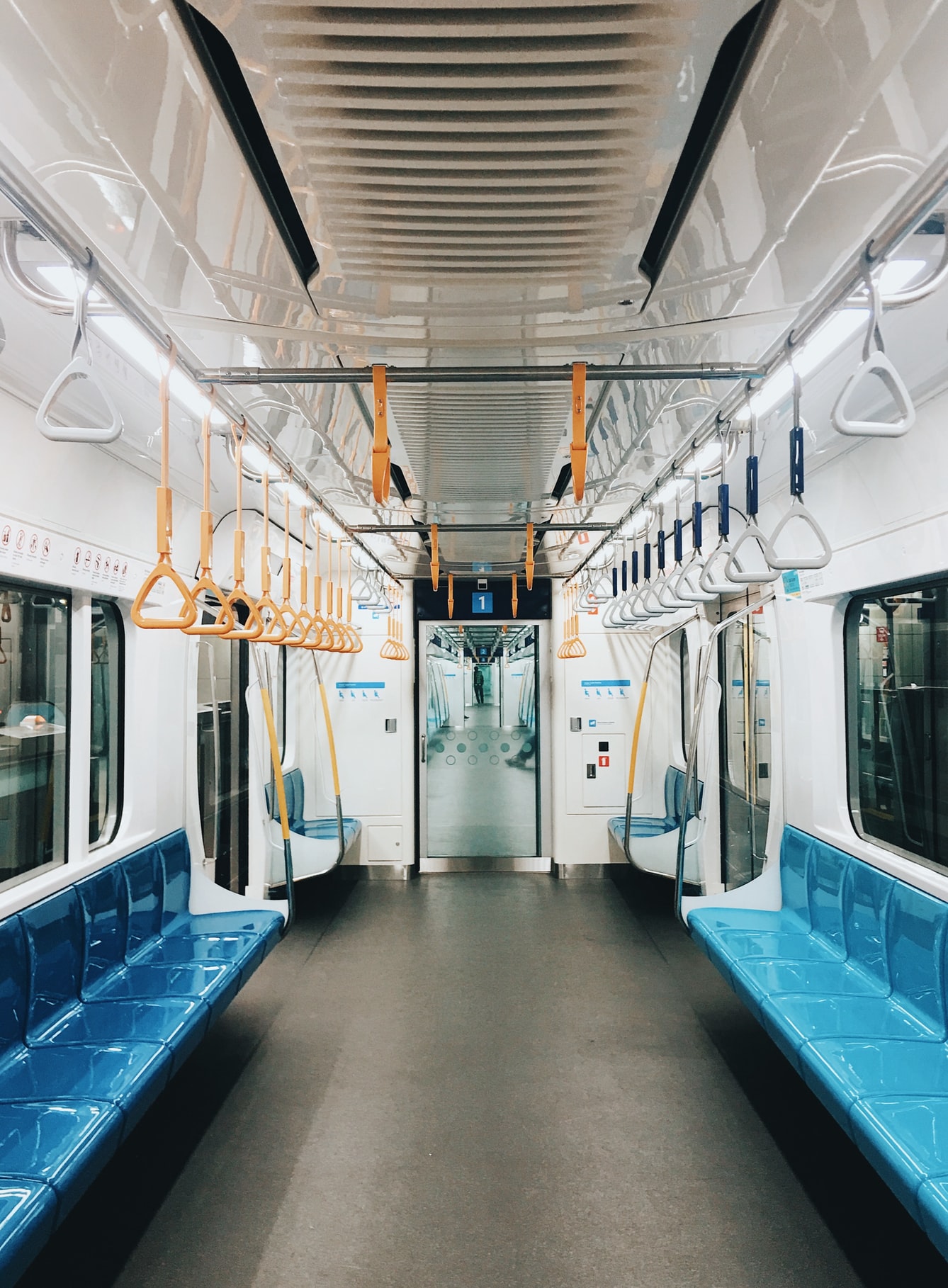
A Jakarta MRT carriage
Image credit: Zalfa Imani
When going about the Jakarta city center, you can take advantage of the MRT which stretches from Bundaran HI right at the heart of the city to Lebak Bulus in South Jakarta, saving time on many people’s commutes every day.
Use this map to see where you want to go before boarding the train.
16. “Saya mau beli tiket ke [location]” (“I want to buy a ticket to [location]”)

Image credit: Eugenia Clara
While MRT stations are equipped with ticket vending machines, you can always buy a ticket at the cashier’s booth in case you have difficulty using the machines. Say “Saya mau beli tiket ke [location]”, which means “I want to buy a ticket to [location]”, which should come in handy when you’re buying a single-journey ticket.
If you plan to visit multiple stops or are staying for a few days, we recommend a JakLingko Card which you can also use for Transjakarta buses and the Commuter Line train. These come in denominations of Rp. 10,000 (~USD0.71), Rp. 20,000 (~USD1.42), Rp. 50,000 (~USD3.55), Rp. 100,000 (~USD7.10), Rp. 250,000 (~USD17.75), and Rp. 500,000 (~USD35.50).
Shopping
Shop like a local by visiting markets, where you can find more local products and fresh produce at prices you can bargain down, unlike in shopping malls.
Here are three phrases that will help you during your Indonesian shopping experience.
17. “Berapa harganya?” (“How much is this?”)

Image credit: Falaq Lazuardi
From fruits and vegetables to locally made souvenirs, there are various gems you can find at local markets. When you find something you like, ask “Berapa harganya?” (“How much is this?”) to figure out the price.
Tag on a “pak” if the seller is a man older than you, “ibu” if the seller is a lady older than you, “mas” if the seller is a man around your age or younger, or “mbak” if the seller is a lady around your age or younger as a term of respect that’ll also help break the ice.
18. “Bisa harganya lebih murah?” (“Can you give me a cheaper price?”)
Impress your market vendor by flexing your Indonesian skills as you bargain by saying “Bisa harganya lebih murah?” (“Can you give me a cheaper price?”).
Keep the vendor happy by buying as much as you can from them after they give you a lower price – who knows, maybe they’ll remember you the next time you visit.
19. “Seribu, lima ribu, sepuluh ribu, dua puluh ribu, lima puluh ribu, seratus ribu” (“1,000, 5,000, 10,000, 20,000, 50,000, 100,000”)
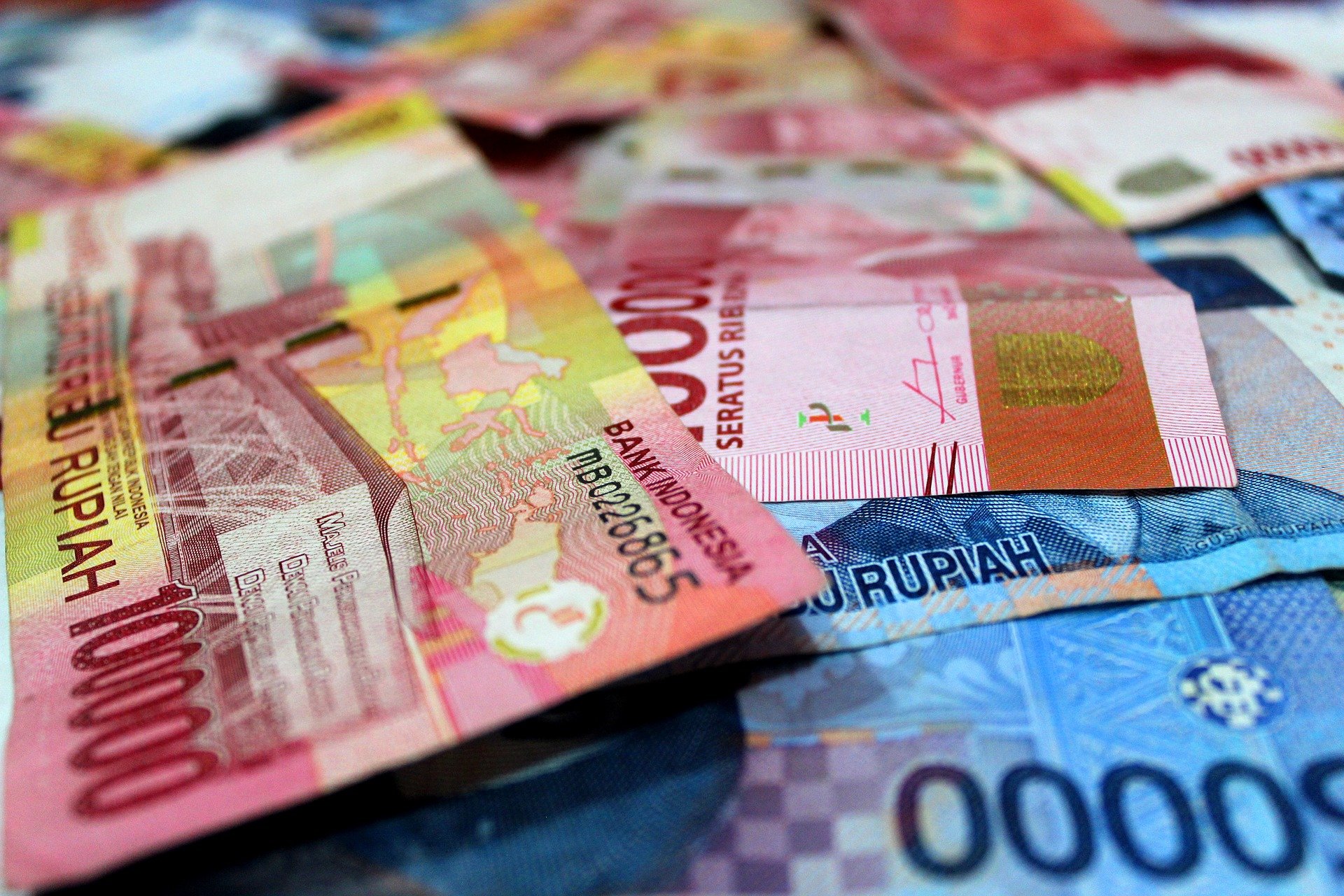
Image credit: Mohamad Trilaksono
It helps to familiarize yourself with common prices and denominations in Indonesian – seribu is 1,000, lima ribu is 5,000, and sepuluh ribu is 10,000.
A handmade bag usually costs Rp. 50,000 (~USD3.75) on average, or lima puluh ribu in Indonesian, for example.
Basic Indonesian phrases to explore the country
We’ve put these phrases into an infographic that you can download and bring with you on your next trip to Indonesia once travelling becomes a thing again!
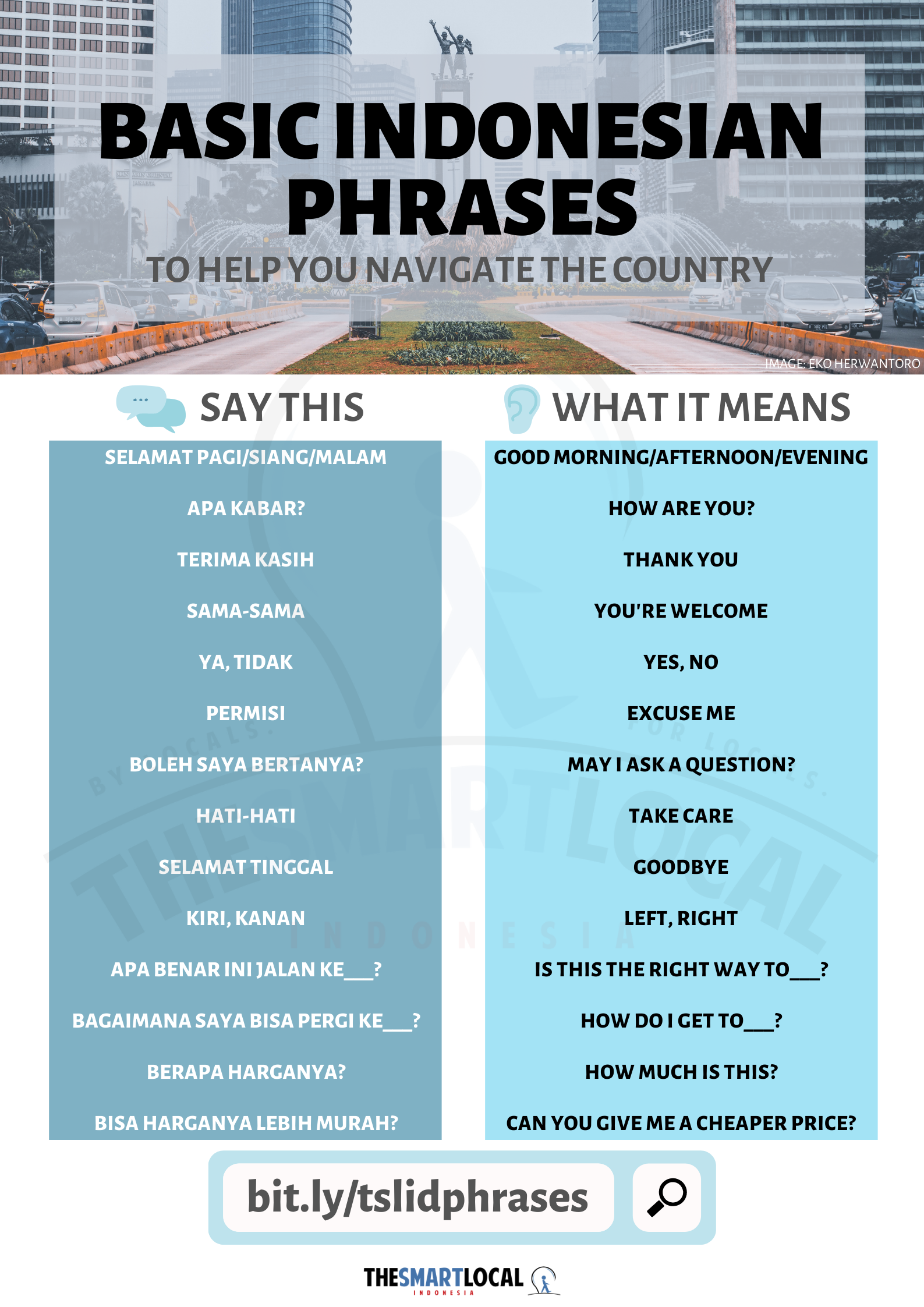
Not only will learning basic Indonesian phrases make your trip easier, but it will also make locals feel more appreciated knowing that you took the extra time and effort to learn these phrases.
Let us know if you’d like to learn more slang and casual phrases too, and we might just come up with an Indonesian slang roundup article soon!
Also check out:
Cover image adapted from: Artem Beliaikin
Enjoying The Smart Local Indonesia? Follow us on Facebook, Instagram, Telegram, and Twitter for more articles like this.
